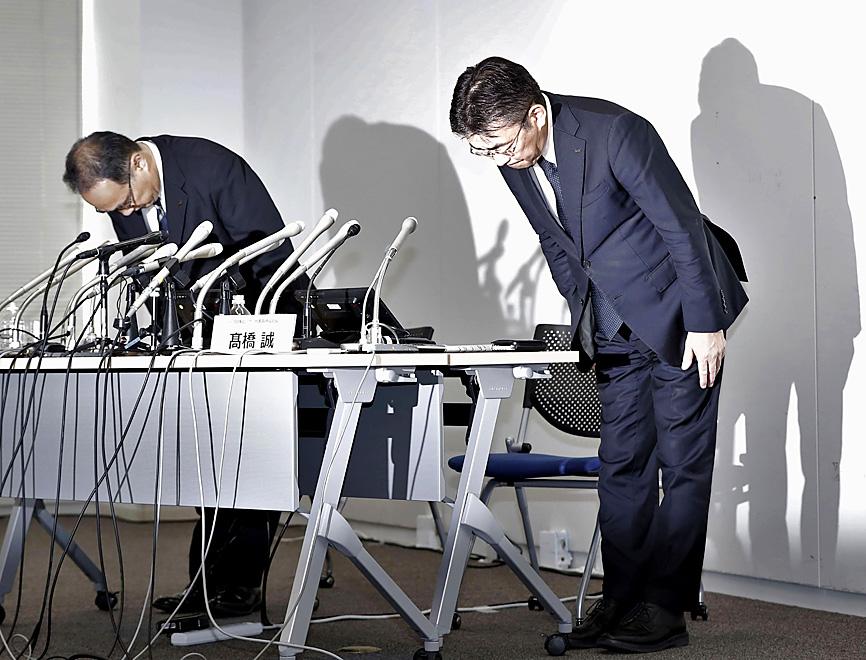Japan’s second-largest mobile carrier by subscribers fell in Tokyo trading after a nationwide disruption of its services over the weekend.
As many as 39 million mobile lines were affected, preventing users from making calls or using data services, until the network was almost fully restored yesterday afternoon.
KDDI Corp, in an unusually large swing for a typically stable stock, dropped as much as 3.9 percent, its biggest intraday fall since March 30. Shares pared their losses by the close, falling 1.7 percent, but still trailed the TOPIX’s 1.3 percent gain.

Photo: AP
The network disruption began early on Saturday and affected KDDI users nationwide as well as other platforms using the carrier’s network, such as weather services, parcel deliveries and ATMs.
Rakuten Mobile, operated by e-commerce company Rakuten Group Inc, said its users were also affected.
Voice and data transmission have been almost fully restored as of 4pm, KDDI said.
“We deeply regret what happened, as a telecommunications company that should provide a stable service and support social infrastructure,” KDDI president Makoto Takahashi said at a news briefing on Sunday, local broadcaster NHK reported. “We’re doing our best on recovery efforts.”
This is not the first time Japan has suffered significant mobile network problems. NTT Docomo Inc reported an outage in October last year that disrupted phone and data communications services nationwide. The government told NTT Docomo in November to improve operations following the incident.
The incident is “very regrettable,” Japanese Minister of Internal Affairs and Communications Yasushi Kaneko told a news conference on Sunday.
KDDI should take drastic measures to prevent any recurrence, he said.
The Ministry of Internal Affairs and Communications is considering issuing administrative guidance, the Asahi Shimbun reported, without attribution.
“This will have a negative impact on share prices in the short term,” Mitsubishi UFJ Morgan Stanley analyst Hideaki Tanaka wrote in a report after the KDDI disruption. “But this is a risk that all major carriers have. I don’t think this will cause major changes to the number of subscribers.”

NEW IDENTITY: Known for its software, India has expanded into hardware, with its semiconductor industry growing from US$38bn in 2023 to US$45bn to US$50bn India on Saturday inaugurated its first semiconductor assembly and test facility, a milestone in the government’s push to reduce dependence on foreign chipmakers and stake a claim in a sector dominated by China. Indian Prime Minister Narendra Modi opened US firm Micron Technology Inc’s semiconductor assembly, test and packaging unit in his home state of Gujarat, hailing the “dawn of a new era” for India’s technology ambitions. “When young Indians look back in the future, they will see this decade as the turning point in our tech future,” Modi told the event, which was broadcast on his YouTube channel. The plant would convert

‘SEISMIC SHIFT’: The researcher forecast there would be about 1.1 billion mobile shipments this year, down from 1.26 billion the prior year and erasing years of gains The global smartphone market is expected to contract 12.9 percent this year due to the unprecedented memorychip shortage, marking “a crisis like no other,” researcher International Data Corp (IDC) said. The new forecast, a dramatic revision down from earlier estimates, gives the latest accounting of the ongoing memory crunch that is affecting every corner of the electronics industry. The demand for advanced memory to power artificial intelligence (AI) tasks has drained global supply until well into next year and jeopardizes the business model of many smartphone makers. IDC forecast about 1.1 billion mobile shipments this year, down from 1.26 billion the prior

People stand in a Pokemon store in Tokyo on Thursday. One of the world highest-grossing franchises is celebrated its 30th anniversary yesterday.

Zimbabwe’s ban on raw lithium exports is forcing Chinese miners to rethink their strategy, speeding up plans to process the metal locally instead of shipping it to China’s vast rechargeable battery industry. The country is Africa’s largest lithium producer and has one of the world’s largest reserves, according to the US Geological Survey (USGS). Zimbabwe already banned the export of lithium ore in 2022 and last year announced it would halt exports of lithium concentrates from January next year. However, on Wednesday it imposed the ban with immediate effect, leaving unclear what the lithium mining sector would do in the